美式英语发音练习
美式英语的发音范文

美式英语的发音范文导语:美式英语与英式英语在发音上是有区别的,下面由解析美式英语的发音,欢送参考!本单元重点是张大嘴巴跟老师一起读,感受美语。
练习我们的脸部肌肉,并体会美语发音的方式和技巧。
1、4个双元音美语音标最大的区别在于其中的元音,过去学过的元音是单元音,但美语中所学的是双元音1){e}-{ei}age, game, daysentence: More haste, less speed.欲速那么不达第一步把每个音发准第二步加上声调练习: It’s pay day today今天是发工资的日子2){o}-{ou}结尾停在uboat, note, so美语发音的特点:尽量在口腔的后部把音发出来。
sentence: I hope so.练习:He posed for a group of photo with his old fellows.注:美语中常常对a和the进展变音,目的是为了强调eg:This is the best opportunity we ever have to enter the market.3) {a}-{ai}bike, mine, flightthis bike of minesentence: All right.注:all不要卷舌练习:Out of sight, out of mind 眼不见,心不烦4) howout, now aboutsentence: Let’ s get out of here.It’s kind of tough.I t’s kind of torture to read mathematics everyday.练习: This is out-and-out power politics. 这是彻头彻尾的强权政治2、2个后元音1){半圆两点}发音技巧:尽量往最里吞这个音not, bottle, hot, job, hospitalsentence: It’s a promise.练习:little red lorry 红色小卡车2){u}good ,book, shouldsentence: She’s looking at a good book.更多例子: new student attitude dueI am for this position.3、辅音t的发音writer, letter, better, city,发音变化一:浊化浊化原那么1:t处在非重读音节要浊化如:writer, letter, better, city,浊化原那么2:t处在重读音节不能浊化如:Italian, attack, atomic, Latino, photographer浊化比照:Italy, attic(阁楼)atom(原子), Latin, photograph发音变化二:t在词组中的发音变化:练习:pick it upI got it.right away发音变化三:t发音的特殊情况:当t发的很快,就会变成n的音interinterviewinterestingrepresentative发音变化四:失去爆破right now, just now发音变化五:t的音从鼻子里出来(美音,英音都有的一种特殊情况)Britain, mountain, fountain4、r的发音1)r在单词中的发音练习: Rolly rolled a round roll around the road.spare, burglar, dirty, porch, more2)r带动后面元音的发音world girl pearlThe girls are the pearls in the world.原那么:只有字母r存在才能卷舌经常发错的音:China, America, idea1、连读1) 相同辅音的连读bad dog 注意:不可以把音节给吞掉,只是这个音节不发音like candyripe pearsome moneyThe report turned out to be totally false.这份报告完全是一派胡言。
立刻说给你一个地道的美式发音

给你一个地道的美式发音喜欢看美剧的人很难不被人们纯正的美式发音所吸引。
对于大部分学习英语的人来说,花在学习的时间不短,但是却无法说出一口流利标准的美英英语。
今天我们就来看一下如何练就更纯正、更有节奏感的的美式发音吧!最关键的是要多加练习,对照起来一条条纠正。
虽然永远无法拥有母语者的发音,但无限接近也是好的……美音的节奏感觉与汉语完全不同,需要着重练习。
美音的节奏是由重读音节和非重读音节的交替而产生的,若想掌握正确地道的节奏感,我们一定要注意八字方针:轻重分明,重弱相间。
中国学生在学习英语的过程中,最主要的难点并不是语音,而是我们平时不太注意的节奏和语调。
如果我们只是会把个别词句发得字正腔圆,而不会把单词、词组组合起来,我们的英语听起来就会极不连贯(very disjointed)。
究其根本,就是我们把说中文一字一顿的习惯生搬硬套到了英语上面。
在英语口语中,节奏和语调实际上是灵魂。
英语中语音不是以单个的形式存在的,语音要连贯起来形成语流才称其为语言。
如果节奏掌握不好,不仅听起来别扭,甚至会影响说话人的思维,导致语言不流畅,重点不突出,意思不分明。
因此,判断一个人会不会说英语,往往不是看他是否能把个别词句的音发准了,而是看他节奏掌握得如何,语调是否自然。
我们不熟悉英语的节奏特点也情有可原,因为我们的母语汉语属于汉藏语系,而英语却属于日耳曼语系。
汉语属于音节语言(syllable-timed language),所以我们讲话习惯于一字一顿。
大家会发现汉语中双音节词特别多,这也是为了照顾汉语的节奏。
相反,英语属于重音语言(stress-timed language),单词有单词的重音,句子有句子的重音,一个句子中的重音的数量比音节的数量更重要。
如果一句话中出现几个重音,那么这几个重音之间的时间距离大致相等。
所以,重读音节感觉上可以读得慢一些,而弱读音节就可以一带而过。
由此可见句子节奏和时间长短(length of time)不可分开。
q发音的训练方法英语 -回复
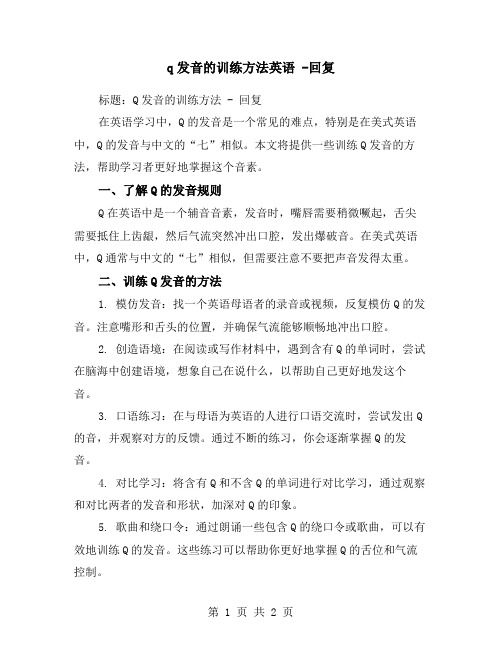
q发音的训练方法英语 -回复标题:Q发音的训练方法 - 回复在英语学习中,Q的发音是一个常见的难点,特别是在美式英语中,Q的发音与中文的“七”相似。
本文将提供一些训练Q发音的方法,帮助学习者更好地掌握这个音素。
一、了解Q的发音规则Q在英语中是一个辅音音素,发音时,嘴唇需要稍微噘起,舌尖需要抵住上齿龈,然后气流突然冲出口腔,发出爆破音。
在美式英语中,Q通常与中文的“七”相似,但需要注意不要把声音发得太重。
二、训练Q发音的方法1. 模仿发音:找一个英语母语者的录音或视频,反复模仿Q的发音。
注意嘴形和舌头的位置,并确保气流能够顺畅地冲出口腔。
2. 创造语境:在阅读或写作材料中,遇到含有Q的单词时,尝试在脑海中创建语境,想象自己在说什么,以帮助自己更好地发这个音。
3. 口语练习:在与母语为英语的人进行口语交流时,尝试发出Q 的音,并观察对方的反馈。
通过不断的练习,你会逐渐掌握Q的发音。
4. 对比学习:将含有Q和不含Q的单词进行对比学习,通过观察和对比两者的发音和形状,加深对Q的印象。
5. 歌曲和绕口令:通过朗诵一些包含Q的绕口令或歌曲,可以有效地训练Q的发音。
这些练习可以帮助你更好地掌握Q的舌位和气流控制。
6. 纠错反思:如果在练习过程中发现自己发错了Q的音,不要灰心丧气,要勇于纠正错误,并反思自己的发音问题,持续改进。
7. 坚持不懈:发音训练需要时间和耐心,不要期望短时间内就能完全掌握。
坚持不懈地进行训练,你会逐渐看到进步。
三、注意事项1. 不要把Q和W混淆:Q和W是两个非常相似的字母,但它们的发音是不同的。
请确保你在发音时正确地区分这两个音素。
2. 不要把Q发得太重:在美式英语中,Q的发音通常与中文的“七”相似,但不要把声音发得太重。
3. 放松舌头:在练习Q的发音时,要尽量放松舌头,让气流自然地冲出口腔。
总之,通过以上方法,你可以有效地训练Q的发音。
记住,发音训练需要时间和耐心,坚持不懈地进行练习,你会逐渐看到进步。
美式英语发音练习

美式英语发音练习### American English Pronunciation PracticeWhen it comes to mastering the American English accent, pronunciation is a crucial aspect that can greatly enhance your fluency and make your speech more natural. Here are some tips and exercises to help you improve your American English pronunciation.#### Understanding the Sound System1. Phonetics Basics: Familiarize yourself with the International Phonetic Alphabet (IPA), which is used to represent the sounds of American English.2. Vowel and Consonant Sounds: Learn the distinct vowel and consonant sounds in American English, and practice them in isolation and in context.#### Listening and Imitation1. Native Speaker Content: Listen to native speakers through movies, TV shows, podcasts, and music. Pay attention to the rhythm and intonation.2. Imitation Practice: Repeat phrases and sentences after native speakers, focusing on matching the sounds and rhythm.#### Tongue TwistersTongue twisters are a fun way to practice specific sounds and improve your pronunciation.- "She sells seashells by the seashore."- "How can a clam cram in a clean cream can?"#### Minimal PairsMinimal pairs are pairs of words that differ by only one sound, which can be particularly challenging for non-native speakers.- "bit" vs. "bet"- "cat" vs. "cut"Practice distinguishing and pronouncing these pairs correctly.#### Stress and Intonation1. Word Stress: Identify the stressed syllables in words and practice emphasizing them.2. Sentence Stress: Learn where to place stress in sentencesto convey meaning and emotion.3. Intonation: Practice the rise and fall of your voice to sound more natural.#### Consonant ClustersConsonant clusters can be tricky, especially at the beginning or end of words.- "Sprint" (/sprɪnt/)- "Gift" (/gɪft/)Practice these words to get comfortable with the rapid succession of consonants.#### Rhotic "R"The American "r" sound is a rolled or trilled sound that canbe challenging for speakers of languages without this feature.- Practice the "r" sound in words like "red," "right," and "rural."#### Final ThoughtsConsistent practice is key to improving your American English pronunciation. Use a variety of resources, such as language learning apps, pronunciation guides, and practice with native speakers to refine your skills. Remember, the goal is notonly to sound like a native speaker but also to be understood clearly and confidently. Happy practicing!。
英语国际音—美式发音
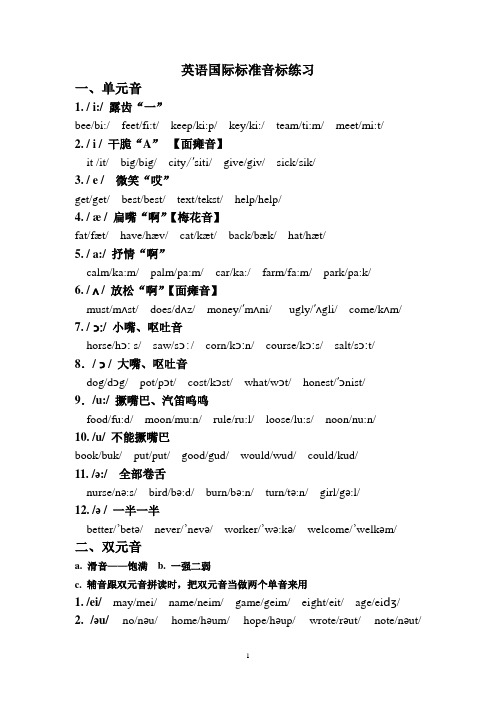
英语国际标准音标练习一、单元音1. / i:/ 露齿“一”bee/bi:/feet/fi:t/ keep/ki:p/ key/ki:/ team/ti:m/ meet/mi:t/2. / i / 干脆“A”【面瘫音】it /it/ big/big/ city/′siti/ give/giv/ sick/sik/3. / e / 微笑“哎”get/get/ best/best/ text/tekst/ help/help/4. / æ / 扁嘴“啊”【梅花音】fat/fæt/ have/hæv/ cat/kæt/ back/bæk/ hat/hæt/5. / a:/ 抒情“啊”calm/ka:m/ palm/pa:m/ car/ka:/ farm/fa:m/ park/pa:k/6. / ʌ / 放松“啊”【面瘫音】must/mʌst/ does/dʌz/ money/′mʌni/ ugly/′ʌgli/ come/kʌm/ 7. /ɔ:/ 小嘴、呕吐音horse/hɔ: s/ saw/sɔ:/ corn/kɔ:n/ course/kɔ:s/ salt/sɔ:t/8./ɔ / 大嘴、呕吐音dog/dɔg/ pot/pɔt/ cost/kɔst/ what/wɔt/ honest/′ɔnist/9./u:/ 撅嘴巴、汽笛呜鸣food/fu:d/ moon/mu:n/ rule/ru:l/ loose/lu:s/ noon/nu:n/10. /u/ 不能撅嘴巴book/buk/ put/put/ good/gud/ would/wud/ could/kud/11. /ə:/ 全部卷舌nurse/nə:s/ bird/bə:d/ burn/bə:n/ turn/tə:n/ girl/gə:l/12. /ə / 一半一半better/’betə/ never/’nevə/ worker/’wə:kə/ welcome/’welkəm/二、双元音a. 滑音——饱满b. 一强二弱c. 辅音跟双元音拼读时,把双元音当做两个单音来用1. /ei/ may/mei/ name/neim/ game/geim/ eight/eit/ age/ei dʒ/2. /əu/ no/nəu/ home/həum/ hope/həup/ wrote/rəut/ note/nəut/pose/pəuz/3. /ai/ eye/ai/ time/taim/ buy/bai/ right/rait/ bike/baik/ kite/kait/4. /au/ 【/au/→/æu/】now/nau/ out/aut/ how/hau/ about/ə′b au t/ south/s auθ/ house/h aus/5. /ɔi/ boy/bɔi/ toy/tɔi/ noise/nɔiz/ voice/vɔis/ point/pɔint/ coin/kɔin/6. /iə/ ear/iə/ near/niə/ idea/ai′diə/ hear/hiə/ mere/miə/ spear/spiə/7. /εə/ air/εə/ tear/tεə/ care/kεə/ dare/dεə/ fair/fεə/ there/ðεə/8. /uə/ tour/tuə/ poor/puə/ sure/ʃuə/ moor/muə/ fuel/fjuəl/ usual/ˈjuʒuəl/三、辅音1. /p/ pea/pi:/ pie/pai/ top/tɔp/ cap/kæp/ people/’pi:pl/ pride/praid/2. /b/bee/bi:/ by/bai/ buy/bai/ black/blæk/ bear/bεə/3. /t/ let/let/ sat/sæt/ feet/fi:t/ team/ti:m/ tide/taid/4. /d/ led/led/ sad/sæd/ feed/fi:d/ do/du:/ dear/diə/5. /k/ lack/læk/ take/teik/ clock/klɔk/ weekend/′wi:kend/6. /g/ big/big/ lag/læg/ gum/gʌm/ good/gud/ guest/gest/7. /f/ face/feis/ fast/fæst/ leaf/li:f/ surf/sə:f/ favorite/′feivərit/8. /v/ very/′veri/ five/faiv/ fever/′fi:və/ serve/sə:v/ never/′nevə/9. /θ/ bath/bæθ/ thick/θik/ mouth/mauθ/ breath/breθ/thought/θɔ:t/ author/´ɔ:θə/10. /ð/the/ ðə/ they/ðei/ that/ðæt/ mother/′mʌðə/ thus/ðʌs/ then/ðen/11. /s/ face/feis/ mouse/maus/ cakes/keiks/ caps/kæps/ likes/laiks/ stops/stɔps/12. /z/ close/kləuz/ keys/ki:z/ boys/bɔi z/ pens/penz/ halves/hævz/13. /tʃ/ catch/kætʃ/ cheap/tʃi:p/ rich/ri tʃ/ watch/wɔtʃ/ child/tʃaild/teach/ti:tʃ/(qu)14. /dʒ/orange/′ɔ:rin dʒ/ large/la:dʒ/ juice/dʒu:s/ job/dʒɔb/(ju)15. /tr/tree/tri:/ try/trai/ true/tru:/ trouble/′trʌbl/ track/træk/ (chuo)16. /dr/ dry/drai/ dream/dri:m/ dress/dres/ drink/driŋk/ hundred/′hʌndrid/(zhuo)17. /ʃ/ she/ʃi:/ sharp/ʃa:p/ fish/fiʃ/ shock/ʃɔk/ shoe/ʃu:/(xi)18. /ʒ/pleasure/′pleʒə/ measure/′meʒə/ television/′teliˌviʒən/ (ri)19. /ts/let′s/lets/ sports/spɔ:ts/ puts/puts/ writes/raits/ seats/si:ts/ (ci)20. /dz/ hands/hændz/ birds/bə:dz/ friends/freindz/ beds/bedz/ stands/stændz/(zi)21. /h/ he/ hi:/ hard/ha:d/ him/him/ heard/hə:d/ half/hæf/(22. /l/like/laik/ late/leit/ learn/lə:n/ lead/li:d/ light/lait/well/wel/ will/wil/ ill/il/ full/ful/ all/ɔ:l/ apple/'æpl/23. /m/ my/mai/ more/mɔ:/ seem/si:m/ meat/mi:t/ mind/maind/ men/men/24. /n/nice/nais/ wind/wind/ mind/maind/ rain/rein/ fine/fain/25. /ŋ/ sing/siŋ/ wing/wiŋ/ ring/riŋ/ long/lɔŋ/26./j/you/ju:/ few/fju:/ yard/ja:d/ music/′mju:zik/ student/′stju:dənt/ excuse/ik′skju:z/ (ye)27. /w/ work/wə:k/ way/wei/ well/wel/ what/wɔt/ twelve/twelv/ twin/twin/28. /r/ red/red/ road/rəud/ right/rait/ wrong/rɔŋ/ problem/′prɔbləm/。
【英语口语】最纯粹的美式发音、口语对话练习及句型讲解(Sadness)

04、SadnessKey Words关键词blue, depressed, desperate, gloomy, low, miserable, painful, sad, sorrow, sorry, tormentingThe Most Common Expressions最常用表达法I'm feeling rather gloomy today.今天我觉得相当抑郁。
I've been eating my heart out.我一直非常悲痛。
I'm deeply sorry to hear about the news.听到消息我深感悲痛。
I'm lonely without you. I feel very miserable.没有你我很孤独,我觉得很痛苦。
Chances are slim. I have no other choice. I feel so desperate.机会渺茫,我别无选择。
我真感到绝望。
It's just been one of those days. I got out of the wrong side of the bed today.真是倒霉的日子,我今天一整天情绪都不好。
I'm feeling really depressed about my work. I think I'm at the end of my rope.我真的对我的工作感到灰心,我想我山穷水尽了。
My heart sunk, for before I knew it, I had gray hair and wrinkles.我心情很沉重,我还不知道怎么回事,我就已经是满头白发,满脸皱纹了。
I'm on the brink of ruin. It seems that everything is happening to me. I don't know what will happen in the future and I have to leave my fate to Heaven.我濒于毁灭的边缘,似乎所有的倒霉事都发生在我身上,我不知道将来会发生什么事,只好听天由命了。
美式英语口语发音教程:由学s和z音标引出的辅音对比练习

以下是整理的《美式英语⼝语发⾳教程:由学s和z⾳标引出的辅⾳对⽐练习》,希望⼤家喜欢!1. Voicing2. Consonant pairs3. Consonant S4. Consonant Z VoicingVoicing is when your vocal cords are vibrating in your throat, creating a buzzing sound. Say Ahhhh. Can you feel the vibrations in your neck? All vowels are voiced. Some consonants are voiced, some are not.Paired Consonants:P&BT&DF&VSH&ZSHK&GS&ZThree rules for S&Z endingsRule 1If a word ends in a sound that is unvoiced (such as P, T, K, F), you add an unvoiced /S/Examples:1 cup,2 cups (the p in cup is unvoiced, so you just add an unvoiced s)1 cat,2 cats (the t in cat is unvoiced, so just add an unvoiced s)I break, he breaksI stop, he stopsRule 2If a word ends in any of these sounds: s, z, sh, ch, or dg (j), when adding an S ending, add IZZZZZZExamples:1 Page2 Pages1 Bus2 Buses1 Lunch2 LunchesI Raise, He RaisesI Brush, He BrushesI Push, He PushesRule 3If a word ends in a vowel sound (like the word Tree) or a voiced consonant (like the word Game), then when you add an S, continue the voicing throughout the entire word, and it should become a voiced ZZZZ.Examples:1 Tree,2 Treezzzz (correctly spelled Trees)1 Day,2 Days1 Shoe,2 ShoesI Fly, He Flies1 Game,2 Games1 Head,2 Heads1 Train,2 Trains1 Song,2 SongsSome common words where S’s are pronounced as Z’sISHISASWASTHESETHOSEEASYBECAUSEParagraph PracticeNotice that all voiced S/Z sounds are underlined.Another zippy, zappy, crazy day comes to a close. As we zoom up to Joe’s snooze zone, Zoe Jones of Zodiac Zoo plays with her zipper.Last week, Jim’s brothers were picked to represent their country in the Olympic Games. Two of the brothers were swimmers, while the other two were long distance runners. All of the brothers wore glasses. These athletes worked hard at qualifying for the games and were hoping to come home with prizes. Since the brothers go to the same university, they often take the same courses. This makes studying easier and gives them more time to do other things.On Thursday, I had a very lazy day. I woke up early and first squeezed oranges into juice. I then got dressed and watched the sunrise come up over the mountains. It was so beautiful that I took many pictures with my camera and I used three rolls of film. After drinking two cups of coffee, I got dressed, left the house, and walked three miles home.。
标准美式英语发音

李阳疯狂英语LI YANG CRAZY ENGLISHLK温馨提示:如果音标显示不正常,请确认您的系统自带有音标字体。
第一章字母发音突破秘诀1最坚实的基础——疯狂突破字母关这是一首优美、现代的字母歌,绝对不是我们从小就熟悉的那首“比较弱智”的字母歌!请一定要反复听、反复模仿。
26个字母、26个单词、26个句子,疯狂模仿,发音必会产生飞跃!A的读音为IPA: [♏♓]I’m afr ai d you’ve m a de a mist a ke.K.K: [♏]恐怕您搞错了。
B的读音为IPA: [♌♓]I won’t be able to finish my work.K.K:[♌♓]我不能完成工作了。
C的读音为IPA:[♦♓]I don’t see what you mean.K.K[♦♓]我不懂你的意思。
D的读音为IPA[♎♓] I’ve heard a great dea l about you.K.K[♎♓]久仰大名。
E的读音为IPA[♓] He is ea sy to deal with.K.K[♓]他很容易打交道。
F的读音为IPA[♏♐] Will you sit on my l ef t?K.K[☪♐] 你坐在我左边好么?G的读音为IPA[♎✞♓]Lots of students wear jea ns nowadays.K.K[♎✞♓]现在很多学生穿牛仔裤。
H的读音为IPA[♏✋♦☞]Let me h ave a look at the book.K.K[♏♦☞] 让我看看这本书。
I的读音为IPA[ ✋] I could,and I should, but I won’t do it.K.K[ ✋] 这个我能做,我也应该做,但我不愿意做。
J的读音为IPA[♎✞♏✋] He was jai led for tow years.K.K[♎✞♏] 他被囚禁了两年。
K的读音为IPA[ ♏✋] In any ca se, it’s none of your business.K.K[ ♏] 无论如何,那事于你无关。
美式英语口语的发音技巧(最新)
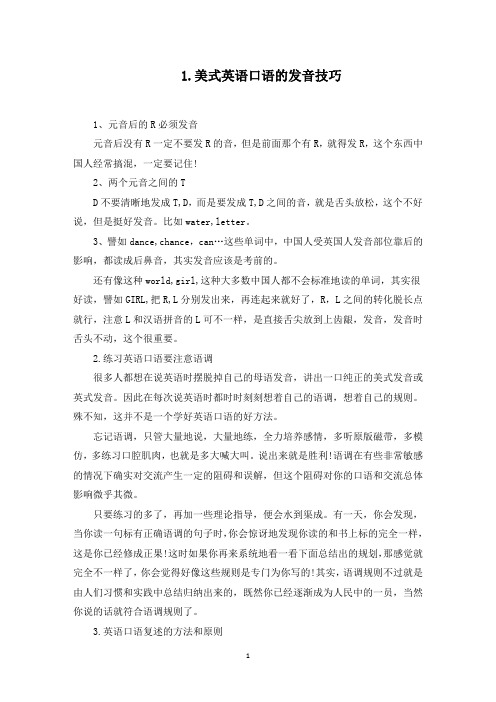
1.美式英语口语的发音技巧1、元音后的R必须发音元音后没有R一定不要发R的音,但是前面那个有R,就得发R,这个东西中国人经常搞混,一定要记住!2、两个元音之间的TD不要清晰地发成T,D,而是要发成T,D之间的音,就是舌头放松,这个不好说,但是挺好发音。
比如water,letter。
3、譬如dance,chance,can…这些单词中,中国人受英国人发音部位靠后的影响,都读成后鼻音,其实发音应该是考前的。
还有像这种world,girl,这种大多数中国人都不会标准地读的单词,其实很好读,譬如GIRL,把R,L分别发出来,再连起来就好了,R,L之间的转化脱长点就行,注意L和汉语拼音的L可不一样,是直接舌尖放到上齿龈,发音,发音时舌头不动,这个很重要。
2.练习英语口语要注意语调很多人都想在说英语时摆脱掉自己的母语发音,讲出一口纯正的美式发音或英式发音。
因此在每次说英语时都时时刻刻想着自己的语调,想着自己的规则。
殊不知,这并不是一个学好英语口语的好方法。
忘记语调,只管大量地说,大量地练,全力培养感情,多听原版磁带,多模仿,多练习口腔肌肉,也就是多大喊大叫。
说出来就是胜利!语调在有些非常敏感的情况下确实对交流产生一定的阻碍和误解,但这个阻碍对你的口语和交流总体影响微乎其微。
只要练习的多了,再加一些理论指导,便会水到渠成。
有一天,你会发现,当你读一句标有正确语调的句子时,你会惊讶地发现你读的和书上标的完全一样,这是你已经修成正果!这时如果你再来系统地看一看下面总结出的规划,那感觉就完全不一样了,你会觉得好像这些规则是专门为你写的!其实,语调规则不过就是由人们习惯和实践中总结归纳出来的,既然你已经逐渐成为人民中的一员,当然你说的话就符合语调规则了。
3.英语口语复述的方法和原则学英语离不开记忆,记忆不是死记硬背,要有灵活性。
复述就是一种很好的自我训练口语,记忆单词、的句子的形式。
复述有两种常见的方法。
一是阅读后复述,一是听磁带后复述。
美式英语英标表48个音标发音
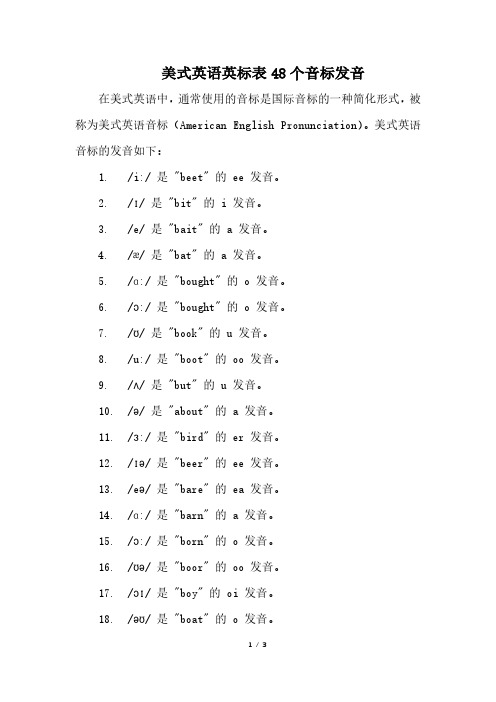
美式英语英标表48个音标发音在美式英语中,通常使用的音标是国际音标的一种简化形式,被称为美式英语音标(American English Pronunciation)。
美式英语音标的发音如下:1. /i:/ 是 "beet" 的 ee 发音。
2. /ɪ/ 是 "bit" 的 i 发音。
3. /e/ 是 "bait" 的 a 发音。
4. /æ/ 是 "bat" 的 a 发音。
5. /ɑ:/ 是 "bought" 的 o 发音。
6. /ɔ:/ 是 "bought" 的 o 发音。
7. /ʊ/ 是 "book" 的 u 发音。
8. /u:/ 是 "boot" 的 oo 发音。
9. /ʌ/ 是 "but" 的 u 发音。
10. /ə/ 是 "about" 的 a 发音。
11. /ɜ:/ 是 "bird" 的 er 发音。
12. /ɪə/ 是 "beer" 的 ee 发音。
13. /eə/ 是 "bare" 的 ea 发音。
14. /ɑ:/ 是 "barn" 的 a 发音。
15. /ɔ:/ 是 "born" 的 o 发音。
16. /ʊə/ 是 "boor" 的 oo 发音。
17. /ɔɪ/ 是 "boy" 的 oi 发音。
18. /əʊ/ 是 "boat" 的 o 发音。
20. /eɪ/ 是 "bait" 的 ai 发音。
21. /aɪ/ 是 "bite" 的 i 发音。
22. /aʊ/ 是 "bout" 的 ou 发音。
美式英语的七个发音技巧
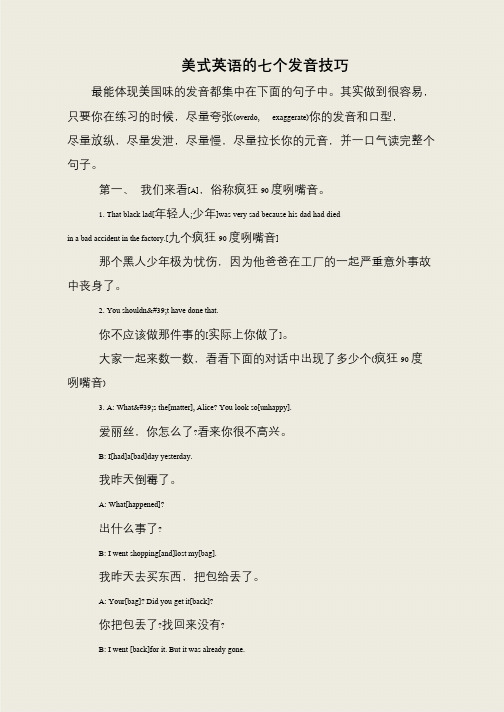
美式英语的七个发音技巧
最能体现美国味的发音都集中在下面的句子中。
其实做到很容易,只要你在练习的时候,尽量夸张(overdo, exaggerate)你的发音和口型,
尽量放纵,尽量发泄,尽量慢,尽量拉长你的元音,并一口气读完整个句子。
第一、我们来看[A],俗称疯狂90 度咧嘴音。
1. That black lad[年轻人;少年]was very sad because his dad had died
in a bad accident in the factory.[九个疯狂90 度咧嘴音]
那个黑人少年极为忧伤,因为他爸爸在工厂的一起严重意外事故中丧身了。
2. You shouldn't have done that.
你不应该做那件事的[实际上你做了]。
大家一起来数一数,看看下面的对话中出现了多少个(疯狂90 度咧嘴音)
3. A: What's the[matter], Alice? You look so[unhappy].
爱丽丝,你怎么了?看来你很不高兴。
B: I[had]a[bad]day yesterday.
我昨天倒霉了。
A: What[happened]?
出什么事了?
B: I went shopping[and]lost my[bag].
我昨天去买东西,把包给丢了。
A: Your[bag]? Did you get it[back]?
你把包丢了?找回来没有?
B: I went [back]for it. But it was already gone.。
美式英语发音音变技巧总结
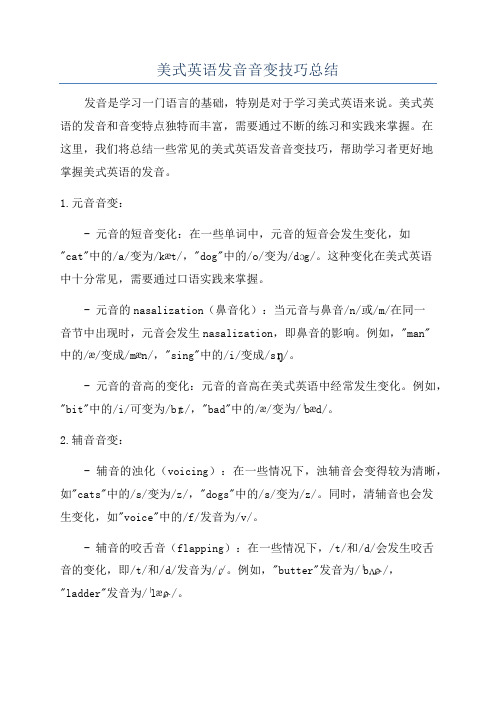
美式英语发音音变技巧总结发音是学习一门语言的基础,特别是对于学习美式英语来说。
美式英语的发音和音变特点独特而丰富,需要通过不断的练习和实践来掌握。
在这里,我们将总结一些常见的美式英语发音音变技巧,帮助学习者更好地掌握美式英语的发音。
1.元音音变:- 元音的短音变化:在一些单词中,元音的短音会发生变化,如"cat"中的/a/变为/kæt/,"dog"中的/o/变为/dɔg/。
这种变化在美式英语中十分常见,需要通过口语实践来掌握。
- 元音的nasalization(鼻音化):当元音与鼻音/n/或/m/在同一音节中出现时,元音会发生nasalization,即鼻音的影响。
例如,"man"中的/æ/变成/mæn/,"sing"中的/i/变成/sɪŋ/。
- 元音的音高的变化:元音的音高在美式英语中经常发生变化。
例如,"bit"中的/i/可变为/bɪt/,"bad"中的/æ/变为/ˈbæd/。
2.辅音音变:- 辅音的浊化(voicing):在一些情况下,浊辅音会变得较为清晰,如"cats"中的/s/变为/z/,"dogs"中的/s/变为/z/。
同时,清辅音也会发生变化,如"voice"中的/f/发音为/v/。
- 辅音的咬舌音(flapping):在一些情况下,/t/和/d/会发生咬舌音的变化,即/t/和/d/发音为/ɾ/。
例如,"butter"发音为/ˈbʌɾɚ/,"ladder"发音为/ˈlæɾɚ/。
- 辅音的消音(elision):在连读的情况下,一些辅音的发音会被省略或消音。
例如,"I have"中的/v/可以省略不发音,发音为/ha:/. 同样地,"didn't"中的/t/可以消音,发音为/dɪdn/.3.连读音变:- 连读音变:在美式英语中,音节之间会发生连读,导致一些音字母发音发生变化。
美式英语音标发音
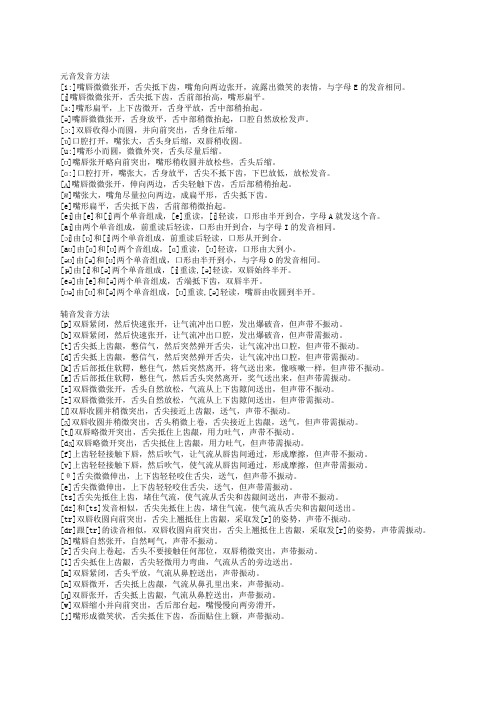
元音发音方法[i:]嘴唇微微张开,舌尖抵下齿,嘴角向两边张开,流露出微笑的表情,与字母E的发音相同。
[ɪ]嘴唇微微张开,舌尖抵下齿,舌前部抬高,嘴形扁平。
[ɜ:]嘴形扁平,上下齿微开,舌身平放,舌中部稍抬起。
[ə]嘴唇微微张开,舌身放平,舌中部稍微抬起,口腔自然放松发声。
[ɔ:]双唇收得小而圆,并向前突出,舌身往后缩。
[ɒ]口腔打开,嘴张大,舌头身后缩,双唇稍收圆。
[u:]嘴形小而圆,微微外突,舌头尽量后缩。
[ʊ]嘴唇张开略向前突出,嘴形稍收圆并放松些,舌头后缩。
[ɑ:]口腔打开,嘴张大,舌身放平,舌尖不抵下齿,下巴放低,放松发音。
[ʌ]嘴唇微微张开,伸向两边,舌尖轻触下齿,舌后部稍稍抬起。
[æ]嘴张大,嘴角尽量拉向两边,成扁平形,舌尖抵下齿。
[e]嘴形扁平,舌尖抵下齿,舌前部稍微抬起。
[eɪ]由[e]和[ɪ]两个单音组成,[e]重读,[ɪ]轻读,口形由半开到合,字母A就发这个音。
[aɪ]由两个单音组成,前重读后轻读,口形由开到合,与字母I的发音相同。
[ɔɪ]由[ɒ]和[ɪ]两个单音组成,前重读后轻读,口形从开到合。
[aʊ]由[ɑ]和[ʊ]两个音组成,[ɑ]重读,[ʊ]轻读,口形由大到小。
[əʊ]由[ə]和[ʊ]两个单音组成,口形由半开到小,与字母O的发音相同。
[ɪə]由[ɪ]和[ə]两个单音组成,[ɪ]重读,[ə]轻读,双唇始终半开。
[eə]由[e]和[ə]两个单音组成,舌端抵下齿,双唇半开。
[ʊə]由[ʊ]和[ə]两个单音组成,[ʊ]重读,[ə]轻读,嘴唇由收圆到半开。
辅音发音方法[p]双唇紧闭,然后快速张开,让气流冲出口腔,发出爆破音,但声带不振动。
[b]双唇紧闭,然后快速张开,让气流冲出口腔,发出爆破音,但声带需振动。
[t]舌尖抵上齿龈,憋信气,然后突然弹开舌尖,让气流冲出口腔,但声带不振动。
[d]舌尖抵上齿龈,憋信气,然后突然弹开舌尖,让气流冲出口腔,但声带需振动。
[k]舌后部抵住软腭,憋住气,然后突然离开,将气送出来,像咳嗽一样,但声带不振动。
美式英语发音教程
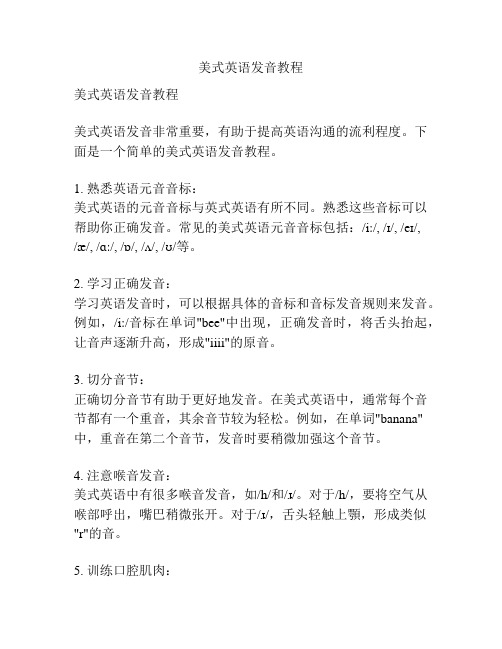
美式英语发音教程美式英语发音教程美式英语发音非常重要,有助于提高英语沟通的流利程度。
下面是一个简单的美式英语发音教程。
1. 熟悉英语元音音标:美式英语的元音音标与英式英语有所不同。
熟悉这些音标可以帮助你正确发音。
常见的美式英语元音音标包括:/iː/, /ɪ/, /eɪ/,/æ/, /ɑː/, /ɒ/, /ʌ/, /ʊ/等。
2. 学习正确发音:学习英语发音时,可以根据具体的音标和音标发音规则来发音。
例如,/iː/音标在单词"bee"中出现,正确发音时,将舌头抬起,让音声逐渐升高,形成"iiii"的原音。
3. 切分音节:正确切分音节有助于更好地发音。
在美式英语中,通常每个音节都有一个重音,其余音节较为轻松。
例如,在单词"banana"中,重音在第二个音节,发音时要稍微加强这个音节。
4. 注意喉音发音:美式英语中有很多喉音发音,如/h/和/ɹ/。
对于/h/,要将空气从喉部呼出,嘴巴稍微张开。
对于/ɹ/,舌头轻触上顎,形成类似"r"的音。
5. 训练口腔肌肉:良好的口腔肌肉控制对于发音非常重要。
平时可以进行一些练习,如快速重复一些发音困难的单词,如"achievement",以提高口腔肌肉的灵活性。
6. 多听多模仿:了解美音的特点,多听多模仿是提高发音的有效方式。
可以收听美国电台节目,观看美剧或电影来提高自己的发音水平。
在模仿时,要注意语速、重音和连读等。
7. 利用发音工具:现在有一些在线发音工具可供使用,可以输入单词并获得正确的发音。
这些工具可以帮助你纠正发音错误并提高准确性。
8. 培养自信心:学习发音需要时间和耐心,不要因为犯错误而泄气。
保持积极的心态,相信自己可以不断进步。
总结起来,要提高美式英语发音,需要熟悉音标,学习正确发音,切分音节,注意喉音发音,训练口腔肌肉,多听多模仿,利用发音工具,以及培养自信心。
【英语口语】最纯粹的美式发音、口语对话练习及句型讲解(Calmness)
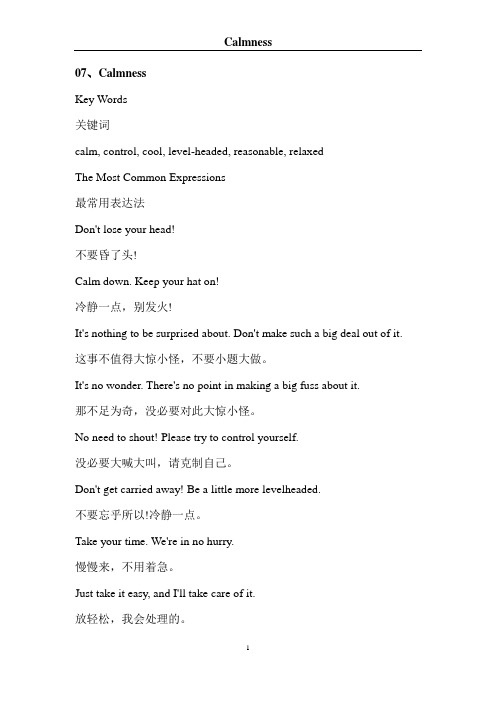
07、CalmnessKey Words关键词calm, control, cool, level-headed, reasonable, relaxedThe Most Common Expressions最常用表达法Don't lose your head!不要昏了头!Calm down. Keep your hat on!冷静一点,别发火!It's nothing to be surprised about. Don't make such a big deal out of it. 这事不值得大惊小怪,不要小题大做。
It's no wonder. There's no point in making a big fuss about it.那不足为奇,没必要对此大惊小怪。
No need to shout! Please try to control yourself.没必要大喊大叫,请克制自己。
Don't get carried away! Be a little more levelheaded.不要忘乎所以!冷静一点。
Take your time. We're in no hurry.慢慢来,不用着急。
Just take it easy, and I'll take care of it.放轻松,我会处理的。
There's no need to get upset about that. I'm sure things will turn out all right.不必为此不安,我确信事情终会好转的。
What's the rush? Learn to walk before you run. Don't put the cart before the horse.急什么?先学会走路再学跑步。
美式英语发音L

Session Five1. Consonant LHi, welcome back. Again my name is Paul Gruber and this is the Pronunciation Workshops---Fifth Training Session. We’re really moving along. In this session, we will cover the L sound, which happens to be another important speech sound. Depending on your native language, some speakers have a very difficult time with the L sound. L sounds are actually very easy. Here are a few things to remember.No.1. When you’re saying a word which begins with an L, your mouth should be wide open and your jaw should be down, like this. That’s an easy one.No.2.Your tongue should rise up and push just behind your top teeth, like this. Notice my mouth is open.No.3. And this is an important part. You pronounce the L sound by dropping and relaxing your tongue~, like that. Now, again you’ll notice that my mouth and jaw are open. This is key. What I don’t want you to do is to be moving your jaw along with your tongue. I don’t want you to be doing this Ah Ah Ah. Your jaw should not be moving at all. Keep it open. Here’s a trick that may help you. Take your finger and put it in your mouth and pull down hard on your lower lip and force your mouth open and your jaw down. Like this. Now, while your jaw is down, bring your tongue tip all the way up behind your teeth and do this LaLaLa. My tongue is coming up but my jaw is staying down. What you’re doing is forcing your mouth and your lower jaw to stay open while you’re raising your tongue up, and that’s what I want. I want your jaw to stay down, your mouth to stay open and your tongue to rise up independently of your jaw LaLaLa, like that and that’ s how you produce a beautiful and clear L. Ok, let’s do some pratice. Repeat these words beginning with the letter L. Here we go.LunchLocalLondonLearnLargeLifeLobbyLibraryLuckyLiftLaughLongVery good. Here are some words with L in the middle of them. When you say these words, focus on the L sound and really push them out.InflationBelieveVolumeGlueElevatorSolvePullingFloodDeleteElectAliveColorOk, let’s talk about when L falls at the end of a word. This is a bigproblem for many foreign speakers, so pay close attention to this. To produce an L sound at the end of a word. Keep in mind that the sound of the L comes from the movement of the Tongue Rising. It does not come from the placement of the tongue, but from the actual movement. Watch me as I say this word. Hill. The L comes from the movement of my tongue. You may want to use that finger trick again. Put your finger in your mouth, pull down on your lower tip and slowly say the word. The only thing that should be moving is your tongue should be coming up. Hill. Your jaw should not be moving at all to let your tongue rise up. Hill. If you’ re having difficulty, produce this in front of a mirror and watch your jaw and your tongue and be sure you don’ t produce the L sound by closing your mouth which many foreign speakers do. Hill. Hill. See how my mouth is closing. Hill. You don’t want to do that. That produces a weak L and to an American listener it is not clear and you may not be understood. Let’s start in practising these words ending with Ls. Here we go.WillBallTallCallSmallControlBowlAppleMiraclePowerfulControlFinancialPeopleNotice in this last word People is not pronounced People with your tongue not moving. It’s People with your tongue slowly moving up and your jaw remaining down. Stretch out that L sound. People, like that. Here’re some sentences that have many Ls in them. Listen carefully to my example and then repeat. Don’t forget to push your tongue behind your upper teeth and to use strong L sounds. Here we go.The lollipop fell into the cool water.Her driver’s license was pulled out of the blue golf bag.Blake’s bowling ball fell under his tools.Carl could not locate the lemons or the limes.The school was a mile away from the hill.The golf club was made of steel.Al’s goal was to play baseball with Carol.A certified letter was delivered for the enrollment list.It was revealing to look at the smiling lawyer.Very good. Now let’s try reciting this poem with FL Blends. Here we’re combining two sounds that we have already covered. The F sound and now the L sound. Don’t forget to first bite your lips for that F/f/, like that and then quickly push your tongue up and against your teeth for the L to create the FL blend Fly, like that. Ok, let’s try this slowly.A flea and a fly flew up in a flue.Said the flea, “Let us fly!”Said the fly, “Let us flee!”So they flew through a flaw in the flue.Ok, let’s do that one more time. This time a little bit faster.A flea and a fly flew up in a flue.Said the flea, “Let us fly!”Said the fly, “Let us flee!”So they flew through a flaw in the flue.Very good. Ok, these next sentences all have the word Will in them. The word Will may be difficult for you because it has that final L sound. Remember try to keep your mouth open, your jaw down as your tongue rises up. By doing this, you’ll produce good final L sound. Again, if you’ re having difficulty, try looking at a mirror, use your finger and push down on your bottom teeth as you say the word Will, like that. This will force you to keep your bottom jaw down as your tongue moves up. Here we go.Will you empty the garbage?Will you ask her to clean the kitchen?Will you prepare a meal for the children?When will you begin your studies at college?When will she purchase the dress for her wedding?Why will he ask them to stay late at work?Why will she bring her baby to the meeting?How will they know if our flight is delayed?Where will the child be going next year?Where will they put all of the pillows?What will she do with the millions of dollars she won?Very good. Now some Japanese and Chinese speakers in particular have difficulty distinguishing between the L sound and the R sound. Now that we have covered both of these sounds I would like to go over some paired words containing these sounds. Keep in mind when you’re producing an L, your tongue moves forward and up behind your tip. When you’re producing an R sound, your lips move forward but your tonguemoves all the way back. Basically, the L and the R are completely opposite sounds. Listen carefully and repeat these paired words.Red - LedRick - LickReef - LeafRear - LearRest - LessGrass - GlassCrime - ClimbFree – FleeVery good. Well, I call the next words LR combinations. These words and phrases having an L sound and an R sound right next to each other. This forces you to make a clear L and then roll it right into a strong R. Here we go. Repeat after me.Seal ringToll roadAlreadyCivil rightsRailroadRivalryCoral reefJewelrySchoolroomGravel roadVery good. As you can see. Ls are very important sounds when they come to speaking understandable English. You should review this material a few times for practice. Have fun and I’ll see you next time. I’m Paul Gruber with the Pronunciation Workshop. Goodbye。
美式发音技巧大全

美式发音技巧大全美式发音是全球英语学习者最为关注的一个问题,因为美音被认为是非常标准和地道的英语发音。
下面是一些美式发音的技巧和练习,希望对您的学习有所帮助。
1.需要掌握的音标学习美式发音首先要掌握国际音标,包括元音和辅音的发音。
熟练掌握音标可以帮助您迅速准确地学习新单词的发音。
2.注意长短元音的区分美式发音中有很多长短元音的区别,例如"bit"和"beat"的/i/音,"pull"和"pool"的/u/音。
要注意这些区别,听声音并模仿练习。
3.呼吸控制和声音发出的位置在发音时要注意呼吸的控制和声音发出的位置。
要保持一个稳定的呼吸节奏,并将声音放在正确的位置,通常是发声口腔的最前面。
4.捣糨糊练习"糨糊"是一种用来训练声音流畅度和连音的练习方法。
选择两个音节相连的两个单词,如"cat"和"dog",然后将它们连接起来变成一个单词"catdog"来练习发音。
5.重音和节奏美式英语重音和节奏的规律是不同于其他英语种类的,要注意单词中的重音部分,并且掌握英语句子的正确语调和节奏。
6.单词的连读美式英语中的连读是非常常见的现象,例如“gonna”代表“going to”,“wanna”代表“want to”。
要学会这些常用的连读并在口语中灵活运用。
7.音调的提升和降低美式英语中,有时需要将音调提高或降低来加强语气或表示语句的结束。
要学会掌握这种提升和降低的技巧,并在适当的场合使用。
8.非母语发音纠正如果您是非母语的英语学习者,那么可能会有一些母语干扰的发音问题。
要通过听力训练和模仿美式发音来纠正这些问题,比如发/s/音时不带浊音。
9.监听和模仿听力训练是提高发音的关键。
要多听美式英语的录音和美国人的口语,然后模仿他们的发音。
可以选取一些短语或句子作为模型,并不断练习。
美式英语部分元音发言指导
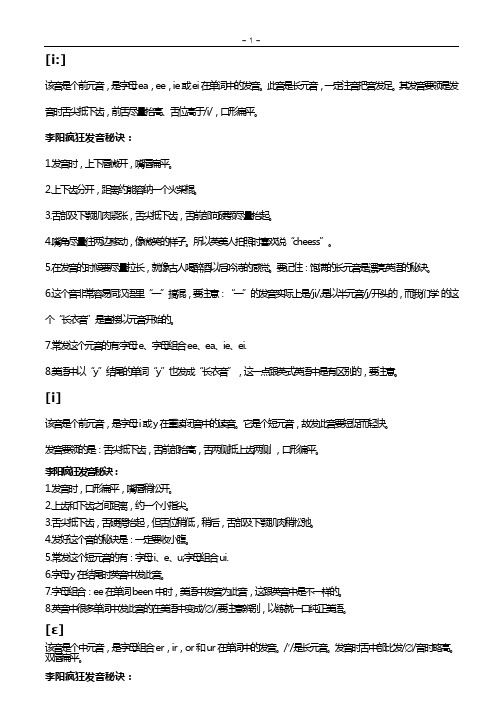
[i:]该音是个前元音,是字母ea,ee,ie或ei在单词中的发音。
此音是长元音,一定注音把音发足。
其发音要领是发音时舌尖抵下齿,前舌尽量抬高、舌位高于/i/,口形扁平。
李阳疯狂发音秘诀:1.发音时,上下唇微开,嘴唇扁平。
2.上下齿分开,距离约能容纳一个火柴棍。
3.舌部及下颚肌肉紧张,舌尖抵下齿,舌前部向硬颚尽量抬起。
4.嘴角尽量往两边移动,像微笑的样子。
所以英美人拍照时喜欢说“cheess”。
5.在发音的时候要尽量拉长,就像古人喝醉酒以后吟诗的感觉。
要记住:饱满的长元音是漂亮英语的秘诀。
6.这个音非常容易同汉语里“一”搞混,要注意:“一”的发音实际上是/ji/,是以半元音/j/开头的,而我们学的这个“长衣音”是直接以元音开始的。
7.常发这个元音的有:字母e、字母组合ee、ea、ie、ei.8.美语中以“y”结尾的单词“y”也发成“长衣音”,这一点跟英式英语中是有区别的,要注意。
[i]该音是个前元音,是字母i或y在重读闭音中的读音。
它是个短元音,故发此音要短促而轻快。
发音要领的是:舌尖抵下齿,舌前部抬高,舌两侧抵上齿两侧,口形偏平。
李阳疯狂发音秘诀:1.发音时,口形扁平,嘴唇稍松开。
2.上齿和下齿之间距离,约一个小指尖。
3.舌尖抵下齿,舌硬腭抬起,但舌位稍低,稍后,舌部及下颚肌肉稍松弛。
4.发好这个音的秘诀是:一定要收小腹。
5.常发这个短元音的有:字母i、e、u;字母组合ui.6.字母y在结尾时英音中发此音。
7.字母组合:ee在单词been中时,美语中发音为此音,这跟英音中是不一样的。
8.英音中很多单词中发此音的在美语中变成/ /,要注意辨别,以练就一口纯正美语。
[ε]该音是个中元音,是字母组合er,ir,or和ur在单词中的发音。
/ /是长元音。
发音时舌中部比发/ /音时略高。
双唇扁平。
李阳疯狂发音秘诀:1.发音时舌身平放。
舌端离下齿,舌中部稍稍抬起。
2.牙床接近半合,是中元音中牙床开得最小的一个。
- 1、下载文档前请自行甄别文档内容的完整性,平台不提供额外的编辑、内容补充、找答案等附加服务。
- 2、"仅部分预览"的文档,不可在线预览部分如存在完整性等问题,可反馈申请退款(可完整预览的文档不适用该条件!)。
- 3、如文档侵犯您的权益,请联系客服反馈,我们会尽快为您处理(人工客服工作时间:9:00-18:30)。
The chaosCapoem about the chaos of the English language Dearest creature in creation,Study English pronunciation.I will teach you in my verseSounds like corpse, corps, horse, and worse. It will keep you, Suzy, busy,Make your head with heat grow dizzy.Tear in eye, your dress will tear.Queer,fair seer,hear my prayer,Pray,console your loving poet,Make my coat look new,dear,sew it!Just compare heart, beard, and heard,Dies and diet, lord and word,Sword and sward, retain and Britain. (Mind the l atter, how it’s written.)Made has not the sound of bade;Say,said,pay,paid,laid but plaid.Now I surely will not plague youWith such words as plaque and ague.But be careful how you speak:Say gush,bush,steak,streak,break,bleak, Previous,precious,fuchsia,via,Recipe,pipe,studding-sail,choir;Woven, oven, how and low,Script, receipt, show, poem, and toe.Hear me say, devoid of trickery,Daughter, laughter, and Terpsichore, Typhoid, measles, topsails, aisles,Exiles, similes, and reviles;Wbolly,bolly,signal,signingSame,examing,but mining,Scholar, vicar, and cigar,Solar, mica, war and far;From”desire”:desirable admirable from “admire”Lumber,plumber,bier but brier,Topsham,brougham,renown but known, Knowledge,done,lone,gone,none,tone,One, anemone, Balmoral,Kitchen, lichen, laundry, laurel; Gertrude, German, wind and mind, Scene, Melpomene, mankind. Tortoise,turquoise,chamois-leather, Reading,reading ,beathen,beather.This phonetic labyrinthGives moss,gross,brook,brooch,ninth,plinth. Billet does not end with ballet, Bouquet, wallet, mallet, chalet.Blood and flood are not like food,Nor is mould like should and would. Discount,viscount, load and broad, Toward, to forward, to reward. Ricocheted and croqueting,croquet?Right!And your pronunciation’s OK Rounded, wounded, grieve and sieve, Friend and fiend, alive and live.Hugh but bug and bood but boot, Buoyant,minute but minute.Would it tally with my rhymeIf I mentioned paradigm? Liberty,library beave and beaven, Rachel,acbe,moustache,eleven. We say ballowed but allowed, People,leopard,towed but vowed Mark the difference,moreover, Between mover,plover,Dover, Leeches,breeches,wise,precise, Chalice but police and lice. Camel,constable,unstable, Principle,disciple,label,Petal,penal and canal,Wait,surmise,plait,promise,pal. Suit,suite,ruin.circuit,conduit Rhyme with “shirk it”and “beyond it”Worm and storm, chaise, chaos, chair, Senator, spectator, mayor.Ivy, privy, famous; clamourHas the a of drachm and “hammer”Stranger does not rhyme with anger, Neither does devour with clangour. Souls but foul, and gaunt but aunt, Font, front, wont, want, grand, and grant, Arsenic,specific,scenic,Relic,rbetoric,bygienic,Prison,bison,treasure-troveTreason,bovver,cover,cove.Don’t be down,my own,but rough it,And distinguish buffet-buffet;Brood,stood,roof,rook,school,wool,stool, Worcester,Boleyn,foul and ghoul.But mind trivial and vial,Tripod,menial,denial,Troll and trolley,realm and ream. Schedule,mischief,schism and scheme. Shoes, goes, does. Now first say :finger, Then say:singer, ginger, linger,Real, zeal, mauve, gauze, gouge and gauge, Marriage, foliage, mirage, and age. Hero,beron,query,very,Parry,tarry,fury,bury,Dost,lost,post and doth,cloth,loth,Job,job,blossom,bosom,oath.Though the difference seems little,We say actual but victualSeat,sweat,chaste,caste,Leigh,eight,beitht, Put,nut,granite and unite.Reefer does not rhyme with deafer. Feoffer does, and zephyr, heifer.Dull,bull,Geoffrey,George,ate,late,Hint, pint, senate and sedate;Gaelic, Arabic, Pacific,Science, conscience, scientific.Tour, but our and succour, four.Gas, alas, and Arkansas.Sea, idea, Korea, area,Psalm, Maria, but malaria.Youth, south, southern, cleanse and clean. Doctrine, turpentine, marine.Compare alien with Italian,Dandelion and battalion.Sally with ally, yea, ye,Eye, I, ay, aye, whey, and key,quay. Say aver, but ever, fever,Neither, leisure, skein, receiver.Query does not rhyme with very,Nor does fury sound like bury.Dost, lost, post and doth, cloth, loth. Job, nob, bosom, transom, oath. Though the differences seem little,We say actual but victual.Refer does not rhyme with deafer.Foeffer does, and zephyr, heifer. Mint, pint, senate and sedate;Dull, bull, and George ate late. Scenic, Arabic, Pacific,Science, conscience, scientific. Liberty, library, heave and heaven, Rachel, ache, moustache, eleven.We say hallowed, but allowed, People, leopard, towed, but vowed. Mark the differences, moreover, Between mover, cover, clover; Leeches, breeches, wise, precise, Chalice, but police and lice; Camel, constable, unstable, Principle, disciple, label.Petal, panel, and canal,Wait, surprise, plait, promise, pal. Worm and storm, chaise, chaos, chair, Senator, spectator, mayor.Tour, but our and succour, four. Gas, alas, and Arkansas.Sea, idea, Korea, area,Psalm, Maria, but malaria.Youth, south, southern, cleanse and clean. Doctrine, turpentine, marine.Compare alien with Italian,Dandelion and battalion.Sally with ally, yea, ye,Eye, I, ay, aye, whey, and key.Say aver, but ever, fever,Neither, leisure, skein, deceiver.Starry ,granary,canary,Crevice but device and eyrie,Face but preface,but grimace, Phlegm,phlegmatic,ass,glass,bass, Bass,large,target,gin,give,verging, Ought,oust,joust and scour but scourging, Ear, but earn and wear and tearDo not rhyme with”here” but”er e”. Seven is right, but so is even, Hyphen, roughen, nephew,Stephen, Monkey, donkey, clerk and jerk,Asp, grasp, wasp, demesne,cork and work. Pronunciation (think of Psyche!)Is a paling, stout and spikey;Won’t it make you lose your wits,Writing “groats” and saying gr oats?It’s a dark abyss or tunnel,Strewn with stones, like rowlock, gunwale, Islington and Isle of Wight,Housewife, verdict and indict.don’t you think so,reader,rather,Saying lather,bather,father?Finally,:which rhymes with “enough”, Though, through, plough, cough,bough or tough? Hiccough has the sound of “sup”.My advice is - give up!!!。
